News Blog
Latest News From Our Volunteers in Nepal
VOLUNTEER COMMUNITY CARE CLINICS IN NEPAL
Nepal remains one of the poorest countries in the world and has been plagued with political unrest and military conflict for the past decade. In 2015, a pair of major earthquakes devastated this small and fragile country.
Since 2008, the Acupuncture Relief Project has provided over 300,000 treatments to patients living in rural villages outside of Kathmandu Nepal. Our efforts include the treatment of patients living without access to modern medical care as well as people suffering from extreme poverty, substance abuse and social disfranchisement.
Common conditions include musculoskeletal pain, digestive pain, hypertension, diabetes, stroke rehabilitation, uterine prolapse, asthma, and recovery from tuberculosis treatment, typhoid fever, and surgery.
FEATURED CASE STUDIES
Rheumatoid Arthritis +

35-year-old female presents with multiple bilateral joint pain beginning 18 months previously and had received a diagnosis of…
Autism Spectrum Disorder +

20-year-old male patient presents with decreased mental capacity, which his mother states has been present since birth. He…
Spinal Trauma Sequelae with Osteoarthritis of Right Knee +
60-year-old female presents with spinal trauma sequela consisting of constant mid- to high grade pain and restricted flexion…
Chronic Vomiting +

80-year-old male presents with vomiting 20 minutes after each meal for 2 years. At the time of initial…
COMPASSION CONNECT : DOCUMENTARY SERIES

Episode 1
Rural Primary Care
In the aftermath of the 2015 Gorkha Earthquake, this episode explores the challenges of providing basic medical access for people living in rural areas.

Episode 2
Integrated Medicine
Acupuncture Relief Project tackles complicated medical cases through accurate assessment and the cooperation of both governmental and non-governmental agencies.

Episode 3
Working With The Government
Cooperation with the local government yields a unique opportunities to establish a new integrated medicine outpost in Bajra Barahi, Makawanpur, Nepal.

Episode 4
Case Management
Complicated medical cases require extraordinary effort. This episode follows 4-year-old Sushmita in her battle with tuberculosis.

Episode 5
Sober Recovery
Drug and alcohol abuse is a constant issue in both rural and urban areas of Nepal. Local customs and few treatment facilities prove difficult obstacles.

Episode 6
The Interpreters
Interpreters help make a critical connection between patients and practitioners. This episode explores the people that make our medicine possible and what it takes to do the job.

Episode 7
Future Doctors of Nepal
This episode looks at the people and the process of creating a new generation of Nepali rural health providers.

Compassion Connects
2012 Pilot Episode
In this 2011, documentary, Film-maker Tristan Stoch successfully illustrates many of the complexities of providing primary medical care in a third world environment.
From Our Blog
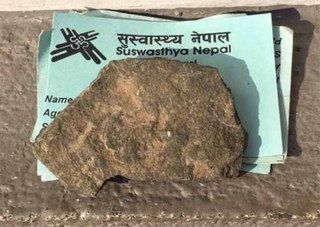
- Details
- By Emma Sanchez
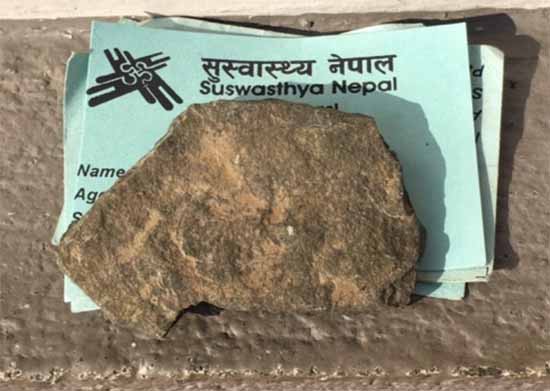
Patients come on a first come, first served basis, often arriving a little before 6am, slipping their appointment cards under a designated stone on the reception window sill. Many will have taken several hours to get to the clinic then may have to wait for some time to be seen, but time has a different value here and we get few complaints.
This different concept of time can manifest in many ways. A patient will often postpone their follow up appointments in order to celebrate a new moon or a festival. Between all the different ethnic groups that make up Nepal, there are more holidays celebrated here than there are days of the year, but neither intolerable pain nor life-threatening conditions are allowed to interfere with these occasions, or the intense periods of preparation and ritual often involved.
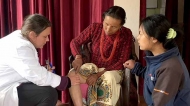
- Details
- By Kimberly Shields
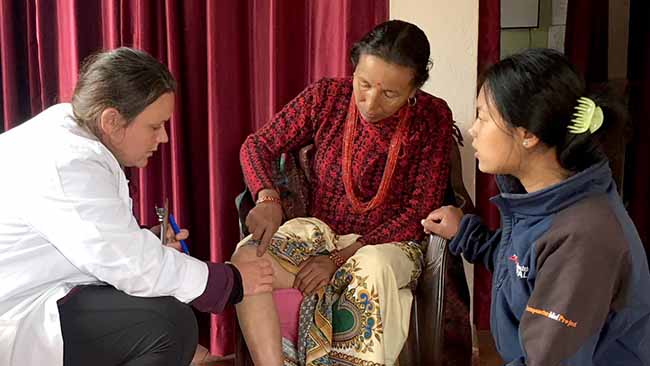
When I started fundraising for this volunteer trip, many friends asked me why I chose to come to Nepal with ARP, and my simple response was, “to step out of my comfort zone.” I have very limited international travel experience, and I knew that providing healthcare in a developing country for an extended period of time would challenge me on various levels, providing me with an opportunity for both personal and professional growth.
Fast-forward to my 8-hour layover in Istanbul, Turkey, en route to Nepal. As I roamed the airport, I realized that several conversations were happening around me in languages unfamiliar to my English-speaking tongue, and I suddenly felt a loss of connection within an airport full of people. My ears searched for words of my native language amongst the crowds of people in transit and waiting, but to no avail. Finally, after some time, I heard English words spoken from the mouth of someone sitting at a table adjacent to mine, and I initiated a conversation with the man who spoke those words that were familiar to me. Only a few hours had passed since I stepped off the plane, but I was already longing to connect with someone amongst the crowd of foreign travelers.
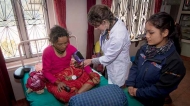
- Details
- By Sugandhi Jordan
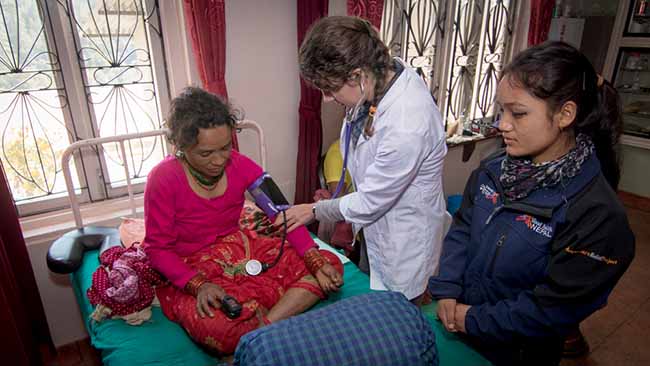
In the foothills of the Himalayas, Bhajra Barahi is made up of steep hills, the slopes of which have been terraced for farming. These plots of rice, cauliflower, mustard, squash, corn and radish cascade down toward the deep valleys with houses dotted all along the way. The main Bazaar of town has a busy road with busses and trucks rumbling through, but within a short distance the roads stops. Many homes and communities and their surrounding farmlands are accessible only by foot. Narrow foot-paths or rock walk-ways traverse through the forest and fields between the terraces. These paths are frequented by women carrying huge baskets resting on their backs and strapped over their foreheads that are full of vegetables, grass for animal feed, or wood from the forest that they will use for cooking fires.
Our Mission
Acupuncture Relief Project, Inc. is a volunteer-based, 501(c)3 non-profit organization (Tax ID: 26-3335265). Our mission is to provide free medical support to those affected by poverty, conflict or disaster while offering an educationally meaningful experience to influence the professional development and personal growth of compassionate medical practitioners.
